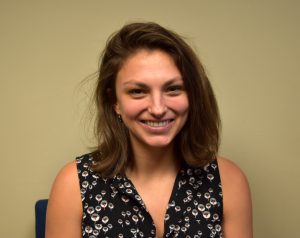Colleen Durfee, a recent master’s graduate in City and Regional Planning from the University of North Carolina at Chapel Hill, was one of two students to receive an Education and Workforce Development Grant from the Coastal Resilience Center of Excellence (CRC) during the 2016-2018 school years. She reflected on her work with the CRC and other projects to bring together practitioners focusing on resilience.

Can you describe the work you did with the CRC during graduate school and how it shaped your career goals?
While a fellow at the CRC I worked on a team that researched how we teach resilient design at the university level in the U.S. I was a part of the research process from start to finish including designing the methodology, collecting the data and analyzing the results. I then attended the Natural Hazards Workshop in Colorado to be on a panel discussing this research. It was rewarding to be given this opportunity to speak about the work I had been a part of for two years. Seeing everyone’s interest in the research was gratifying and opened doors for further investigation on the topic.
You were part of organizing a student research symposium – can you talk about that experience?
The student research symposium was intended to give students the opportunity to present their own work related to hazards and resilience and bring in speakers from the resilience field to discuss their work and network with the students. It took a lot of coordination among the planning students and other departments at UNC, Duke and North Carolina State University. This past year, we worked with the Climate Change Symposium to combine our events and get more attendance. This worked out very well because the symposium was on campus. The first year I helped with the symposium I also presented on the role of gender in disaster situations. The second year, I moderated a panel on rural disaster recovery and vulnerability.
What was the most memorable part of your time in the certificate classes? What sticks with you the most?
The most memorable part of the certificate classes was the speaker series. Specifically, I was inspired by the female speakers that came in to talk about their work in this field. We had a legal scholar from the law school discuss her work on post-disaster state of emergencies and the changes to regulations and oversight allowed in an emergency. We also had the Mayor of Hoboken, Dawn Zimmer, who worked on rebuilding her city post-Sandy. She described the difficulty in meeting people’s immediate needs while planning for a long-term recovery that accounted for future sea level rise.
Can you talk about your experiences working in eastern North Carolina for the Hurricane Matthew recovery initiative?
Working on Hurricane Matthew recovery was an eye-opening experience. I saw directly how complicated post-disaster processes are and how difficult it is to address immediate needs while also asking people to think long-term into the future.
What does the future hold for you?
I just started a position with the City of University City in Missouri, a city just outside of St. Louis, as a Planning and Zoning Administrator. I will be working on the comprehensive plan update as well as be a part of the stormwater task force.
